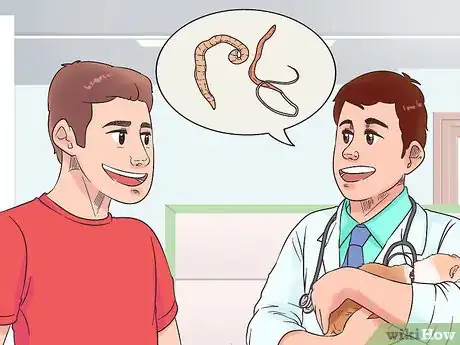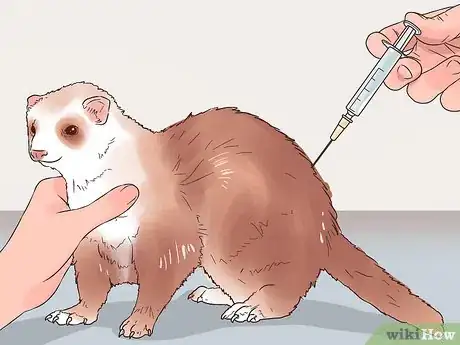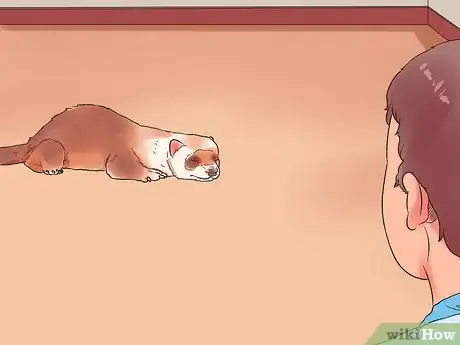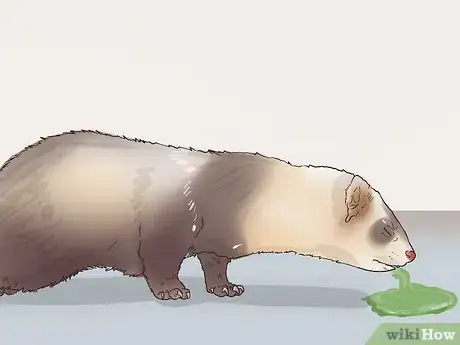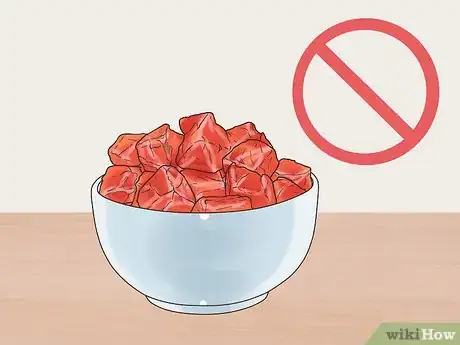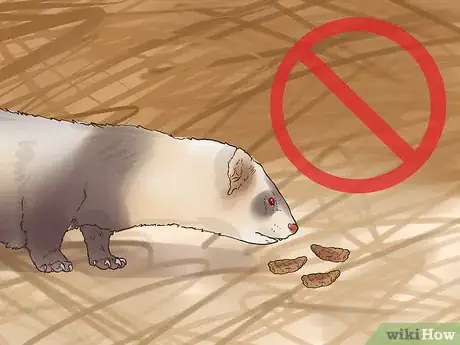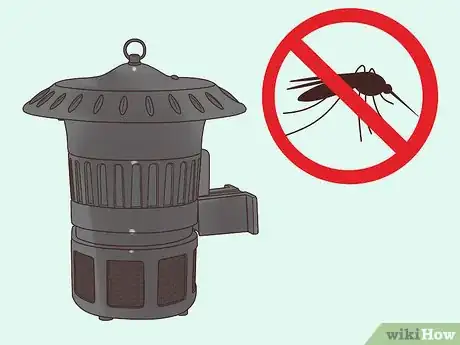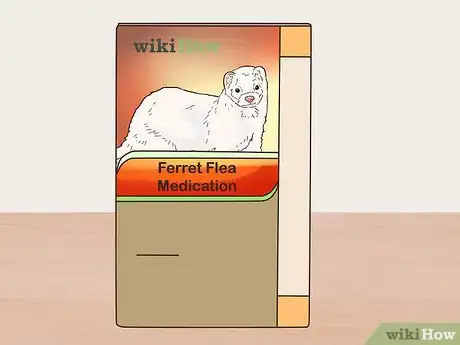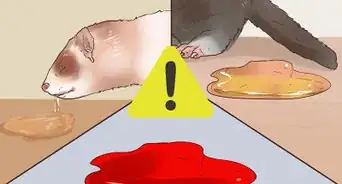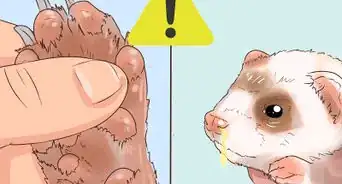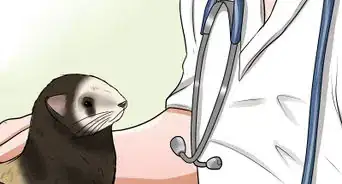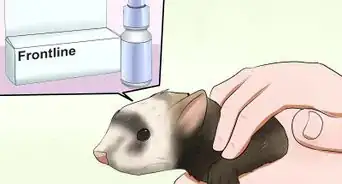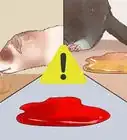This article was co-authored by Lauren Baker, DVM, PhD. Dr. Lauren Baker is a Veterinarian and Assistant Scientist at the University of Wisconsin-Madison. With over 10 years in veterinary medicine, she specializes in the concept of “one health,” which uses insights from veterinary medicine to help human medical research. She holds a Ph.D. in Comparative Biomedical Sciences, a Doctor of Veterinary Medicine, an MS in Comparative Biomedical Sciences, and a Bachelor’s degree in Psychology from the University of Wisconsin-Madison.
There are 10 references cited in this article, which can be found at the bottom of the page.
This article has been viewed 21,324 times.
Ferrets are fun and curious pets that will add constant entertainment to your life. Unlike dogs and cats, they also don't often suffer from worms. In case your ferret is one of the unlucky few who gets infected, be prepared to take care of them. All worms need to be treated by a vet, so be sure to visit your vet's office as soon as your ferret shows symptoms. Watch for changes in your ferret's weight, behavior, and coat to diagnose the worms. You should also limit your ferret's exposure to mosquitoes and fleas, raw meat, or animal feces to prevent worms from affecting your furry friend in the first place!
Steps
Treating Worms
-
1Visit the vet if you think your ferret has worms. All forms of worms need to be treated by your vet. While most worms can be easily addressed, you'll need an exam to make sure your ferret gets the correct diagnosis. This will allow your vet to prescribe the right medication and dosage.
-
2Give an oral or injectable medication for other forms of worms. Luckily, most other worms can be easily treated. Your vet will decide what prescription and dosage your ferret needs. Follow your vet's instructions on administering oral meds at home to make sure your ferret gets better.[1]
- If your vet prescribes an injectable medication, they'll give them the first shot while you're at the clinic. You'll need to bring your ferret back to their office for any necessary follow-up shots.
- Common deworming medications include mebendazole and ivermectin. Ivermectin can be given orally or via shot.[2]
Advertisement -
3Understand the risks of heartworm. Unfortunately, there's no cure for heartworm, which is spread by mosquitoes. These parasites can lead to the development of a fatal heart disease in many animals. There is no approved treatment available for ferrets that will reliably improve their health.[3]
- To keep your ferret healthy, you should instead take steps to prevent heartworm. Heartworm is spread by mosquito bites, so protecting your ferret from mosquitos will prevent heartworm.
- Make sure that you also keep any dogs or cats in your home up to date on their heartworm tests and prevention.
-
4Monitor your ferret's symptoms after treatment. Your ferret's health should improve quickly once they've been treated. Take their weight daily to make sure they're gaining back any losses. Call your vet right away if they stop eating, appear tired, or show signs of an upset stomach.
- These could all be signs that the worms haven't been eliminated, or that they've caused internal damage.
Diagnosing Worms
-
1Check for worms during your ferret's first visit to the vet. Unlike kittens and puppies, baby ferrets (called kits) won't be automatically treated for worms because worms are relatively uncommon in ferrets. Whether you're taking a kit or an older ferret to the vet for the first time, bring along a stool sample to give the vet for testing. Your vet will only treat for worms if the sample tests positive.[4]
- Ask your vet how they'd like you to collect the stool sample. Most will recommend using a small plastic bag to gather a fresh sample as close to your visit as possible. Label the bag in permanent marker with your name and your ferret's name, as well as the date.
- Use gloves and wash your hands immediately after handling your ferret's feces.
-
2Observe your ferret's coat. Worm infestations, including an intestinal worm called trichinosis, may cause your ferret's coat to become dull.[5] That is why it is a good idea to check your ferret's coat regularly to check for changes.
-
3Weigh your ferret to see if it has lost weight. Other forms of worms, including hookworms, roundworms, tapeworms, flukes, and lungworms, usually cause ferrets to lose weight. Use a kitchen scale to weigh your ferret. Keep your hands just above the ferret and speak to it gently to keep it calm and still.[6]
- Adult male ferrets usually weigh between 2 to 5 pounds (0.91 to 2.27 kg), and females generally weigh between 1 to 2 pounds (0.45 to 0.91 kg).[7]
- If you don't know your ferret's normal weight, call your vet to find out what it weighed at its last checkup.
-
4Look in their cage for signs of diarrhea or infrequent urination. Most worms will also make your ferret develop diarrhea and runny droppings. Ferrets affected by flukes, an intestinal worm, may also have trouble urinating.[8]
- You should be aware of what your ferret's droppings normally look like to get a good comparison. It's also important to know how often your ferret usually urinates.
-
5Watch for signs of an upset stomach. If your ferret has diarrhea or is vomiting, its stomach is probably hurting. You may also notice that your ferret isn't as interested in its food.[9] This is especially typical with intestinal worms like flukes.[10]
- Be sure to also check if your ferret has a pot belly. This could indicate that a worm has taken up residence!
Preventing Worms
-
1Keep your ferret indoors. Since worms are spread through animal feces and raw meat that your ferret could easily eat in the great outdoors, the easiest way to prevent worms is to make your ferret indoor-only. Ferrets are perfectly happy to stay inside so long as they have enough toys and interaction time to entertain them.[11]
-
2
-
3Prevent your ferret from eating cat or dog feces. If your dog has an accident in the house, quickly clean it up. Keep your cat's litter box in a place that your ferret can't get to, or put the box and your cat in a separate room when you let ferret out. If your ferret does consume dog or cat feces, call your vet and make an appointment to get them checked for worms.[14]
- If your ferret and cat like to hang out together, you may not be able to put the cat's litter box away when your ferret is out of its cage. Instead, watch your ferret closely during these playtimes.
- Keep your other pets up to date on parasite prevention as well so that this will be less of a concern.
-
4Provide a heartworm preventative monthly. As with dogs and cats, the vet can prescribe monthly meds for your ferret to keep them from getting heartworm. It's especially important for them to get this treatment if you live in an area with lots of mosquitoes.[15]
- Even if your ferret doesn't go outside, mosquitoes can get in your house and bite your furry little friend!
-
5Give your ferret flea medication to protect against tapeworms. Tapeworms are most commonly spread by fleas who have eaten tapeworm eggs. If that flea gets into your ferret's intestinal system, the eggs will hatch! The best way to prevent tapeworms, then, is to put your ferret on a monthly flea prevention medication.[16]
- While fleas prefer dogs and cats, they'll live on a ferret as well.
- Get this prescription directly from your vet, as not all flea medications are safe for ferrets.
References
- ↑ http://myferretpet.com/2014/05/my-ferret-is-losing-weight-causes-and.html
- ↑ http://www.cypresskeep.com/Ferretfiles/Parasites-FM.htm
- ↑ http://www.merckvetmanual.com/circulatory-system/heartworm-disease/overview-of-heartworm-disease#v21494122
- ↑ http://www.peteducation.com/article.cfm?c=11+1290&aid=551
- ↑ http://www.cypresskeep.com/Ferretfiles/Parasites-FM.htm
- ↑ http://www.cypresskeep.com/Ferretfiles/Parasites-FM.htm
- ↑ https://www.petcha.com/stages-of-ferret-aging-revealed/
- ↑ http://www.cypresskeep.com/Ferretfiles/Parasites-FM.htm
- ↑ http://azeah.com/small-mammals-ferrets/ferret-diet-recommendations
- ↑ http://www.cypresskeep.com/Ferretfiles/Parasites-FM.htm
- ↑ https://www.petcha.com/parasites-and-ferrets/
- ↑ http://www.peteducation.com/article.cfm?c=11+1296&aid=498
- ↑ http://www.cypresskeep.com/Ferretfiles/Parasites-FM.htm
- ↑ http://www.cypresskeep.com/Ferretfiles/Parasites-FM.htm
- ↑ http://todaysveterinarypractice.navc.com/ahs-heartworm-hotline-diagnosis-treatment-prevention-of-heartworm-disease-in-ferrets/
- ↑ https://www.petcha.com/ferrets-and-tapeworms/
About This Article
If you're worried that your ferret has worms, it's important that you take it to the vet so they can figure out what kind of worms it has and recommend the best treatment plan. The vet will likely prescribe an oral medication that you can administer at home. However, they might prescribe an injectable medication, in which case you'll need to bring your ferret back in at a later date for follow-up shots. Once your ferret is worm free, there are things you can do to prevent worms from coming back, like keeping it indoors and not feeding it raw meat. Additionally, consider giving your ferret a heartworm and flea preventative once a month to help prevent heartworms and tapeworms. For tips from our Veterinary co-author, like how to diagnose worms in your ferret, keep reading.
